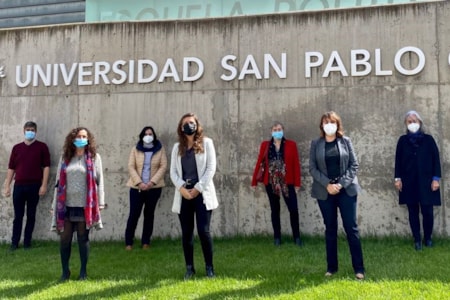
A
study demonstrating the benefits of the new drug Compound
21 has been published in the prestigious journal Clinical Science as
a result of research conducted by the Metabolism
and Vascular Function Group- at the Universidad CEU San Pablo led by Dr. Marta Viana, and under the supervision of Drs. Beatriz Somoza
and Marta Gil Ortega. The
research project was run in collaboration with Dr. Marisol Fernández Alfonso
from the Universidad Complutense de Madrid, GESCAMET; Dr. Ulrike Muscha
Steckelings from the University of Southern Denmark; Dr. Thomas Unger, from Maastricht University; and Dr. William Boisvert, from the University
of Hawaii. It was financed by the Fundación
Universitaria San Pablo CEU / Banco Santander and the Ministry of Economy and Competitiveness.
This research shows the
complications provoked by a high-fat diet on endothelial angiotensin II type 2
receptor (AT2R) signaling. This receptor, with an important role in the
regulation of arterial tone by maintaining the vascular endothelium
functionality through the activation of nitric oxide synthesis, exerts its
effects through the formation of dimers with the bradykinin type 2 receptor
(B2R) and the Mas receptor (MasR). However, obesity interferes in the
communication between these receptors, leading to vascular damage.
The
treatment with Compound 21 prevents these alterations by promoting the dimerization
and signaling of these receptors, thereby increasing nitric oxide availability
and preserving endothelial function. "In this sense, this work
represents an important progress in the knowledge of new molecular mechanisms
that underlie the development of vascular damage associated with obesity,"
explains Beatriz Somoza, adding that "Compound
21 is an activator of the so-called 'protective arm' of the renin-angiotensin
system that could constitute a potential therapeutic tool in the treatment of
vascular damage in obese people due to its non-peptide structure and its oral
activity”.
Overweight is an important risk
factor for the development of cardiovascular diseases - one of the leading
causes of death in the world. While obesity treatment has improved in recent
years, vascular damage in obese patients is difficult to reverse. The
researchers insist that it is therefore necessary to conduct further research on
the mechanisms involved in the development of such damage, and to search for
more effective drugs.
According to Raquel González-Blázquez and Martín Alcalá,
"it is interesting to point out that the vascular effects of Compound
21 are independent of its metabolic effects since no changes in body weight are
observed in response to treatment". In addition, Marta Gil Ortega states, "the study
also shows that Compound 21 can contribute both to identifying new therapeutic
targets and to the design of new effective drugs in the treatment/prevention of
vascular disorders observed in obesity".
Compound 21 has been
recognized as an orphan drug - a type
of drug aimed at treating rare diseases that is not widely developed by the
pharmaceutical industry for economic reasons, but which meets public health
needs – for the treatment of idiopathic
pulmonary fibrosis, either by European
regulatory authorities and by
those of the United States. Furthermore,
it is currently being tested for the treatment
of COVID-19 in a
Phase III clinical trial.